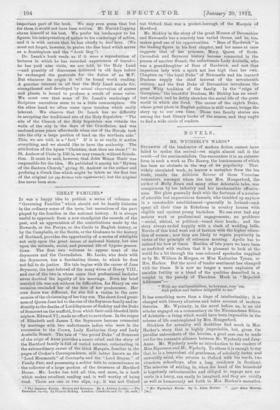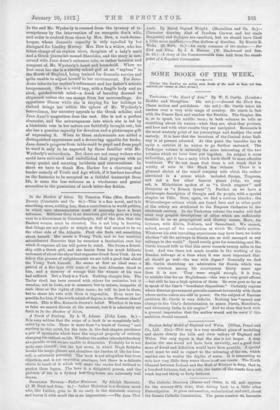NOVELS.
MR. WYCHERLY'S WARDS.*
STUDENTS of the tendencies of modern fiction cannot have failed to notice the revival—we might almost call it the revolt—of the sentimentalists. One encounters it in an extreme form in such a work as The Rosary, the lueciousness of which has been no obstacle in the way of its popularity. That widely circulated work, to borrow a metaphor from the tea. trade, recalls . the delicious flavour of those Victorian romancers, amongst whom the late Mrs. Hungerford, the author of Molly Bawn and many other delectable tales, was conspicuous by her industry and her inexhaustible effusive- ness. Her plots generally dealt with the fortunes of a number of adorable but impecunious damsels, who tumbled up anyhow- in a ramshackle establishment—generally in Ireland—and. spent all their time in flirtations in country houses with eligible and opulent young bachelors. No one ever had any serious work or professional engagements ; no problems —social, ethical, or political—vexed their heads ; and the story always ended happily with a clash of wedding bells. Novels of this kind went out of fashion with the higher educa- tion of women ; now they are likely to regain popularity in virtue of the principle of extremes meeting. Apollo has to unbend his bow at times. Besides, of late years we have been so surfeited with realism that it is pleasant to look at the world for a hit through the rose-coloured spectacles supplied us by Mr. William de Morgan, or Miss Katharine Tynan, or Mrs. Harker. But the novel of tender sentiment has change& with the times. It is now no longer a mere explosion of amiable futility or a blend of the qualities described in a couplet in the parody of Theodore Hook in "Rejected:
Addresses"—
" With my sentimentalibus, lachrymme, roar 'em, And pathos and bathos delightful to see."
It has something more than a tinge of intellectuality; it is charged with literary allusions and takes account of modern. theories. Mr. Wycherly, in the novel before us, is an old scholar engaged on a commentary on the Nicomachean Ethics of Aristotle—a thing which would have been, impossible in the scheme of life contemplated by Mrs. Hungerford.
Sticklers for actuality will doubtless find much in Mrs. Harker's story that is highly improbable, but, given the peculiar antecedents of the heroine, a good case can be made' out for the romantic alliance between Mr. Wycherly and Jane- Anne. Mr. Wycherly needs no introduction to the readers of ' Miss Esperance and Mr. Wycherly. To others it is enough to sa.y' that he is a benevolent old gentleman, of scholarly tastes and' unworldly mind, who returns to Oxford with his wards, two vivacious schoolboys, after a long residence in Scotland. The miseries of settling in, when the head of the household is hopelessly unbusinesslike and obliged to engage new sor vants in a hurry, can easily be imagined, and they are vividly as well as humorously set forth in Mrs. Harker's narrative:
• Mr. Wycherla's Wards. By L. Allen Unrke• John Idurrosy. [Cal
In the end Mr. Wycherly is rescued from the tyranny of in- competence by the intervention of an energetic don's wife, and order is evolved from chaos by Mrs. Dew, a cook-house- keeper, whose domestic capacity is only equalled by her disregard for Lindley Murray. Mrs. Dew is a widow, who has taken charge of an orphan niece, daughter of a lady's maid and a Greek journalist named Stavrides, and the story is con- cerned with Jane-Anne's entrance into, or rather invasion and conquest of, Mr. Wycherly's heart and household. When we first meet her she is a charity school girl at an " asylum " in the North of England, being trained for domestic service and quite unable to adjust herself to her environment. For June- Anne inherits her mother's refinement and her father's artistic temperament. She is a vivid imp, with a fragile body and an alert, quioksilverish mind—a freak of heredity doomed to shipwreck unless she can escape from her surroundings. An opportune illness while she is staying for her holidays in Oxford brings her within the sphere of Mr. Wycherly's benevolence, her ancestry appeals to the Greek scholar, and Jane-Anne's magnetism does the rest. She is not a perfect character, and the extravagances into which she is led by a histrionic vein in her nature are faithfully brought out; but she has a genuine capacity for devotion and a picturesque gift of expressing it. When to these endowments are added a distinguished appearance and a devouring appetite for books, Jane-Anne's progress from table-maid to pupil and from pupil to ward is only to be expected by those familiar with Mr. Wycherly's antecedents. But there are not many writers who could have enlivened and embellished that progress with so many quaint and amusing incidents and conversations. In short we have to thank Mrs. Harker for a charming and tender comedy of Youth and Age which, if it borders too often on the fantastic to be accepted as a faithful transcript from life, is none the less welcome as a wholesome and genial corrective to the pessimism of much latter-day fiction.











































 Previous page
Previous page